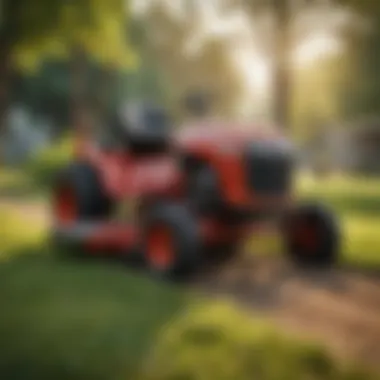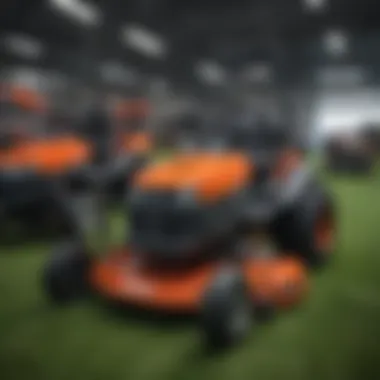Understanding Lawn Mower Companies: A Comprehensive Overview


Intro
Lawn mower companies have evolved significantly over time. Understanding their development offers insights into market dynamics, product offerings, and consumer preferences. Knowledge of technological advancements in this sector also helps in making informed decisions about purchasing equipment suited for diverse needs. This overview will explore various factors shaping the industry, address important trends, and shed light on sustainability practices.
Research and Data Analysis
Analyzing lawn mower companies requires a close look at the agricultural and horticultural sectors. The rising need for efficient grass management tools reflects changes in consumer habits and environmental considerations. Recent studies highlight the importance of innovative technologies and their role in transforming lawn care practices.
Latest Trends in Agriculture and Horticulture
The shift towards electric and battery-operated mowers indicates a significant trend. Many manufacturers are focusing on reducing carbon footprints and promoting energy efficiency. This is increasingly relevant as consumers become more environmentally conscious. Other trends include smart technology integration, enabling features like automated mowing through mobile applications, enhancing user experience and productivity.
Statistical Insights into Crop Yields
Data shows that improved equipment can directly correlate with yields. For instance, advancements in mower design increase efficiency and reduce the time needed for lawn care. While these statistics are more related to cutting methods, they reflect a growing trend in optimizing agricultural practices through efficient machinery.
Best Practices and Techniques
Incorporating best practices can lead to better lawn maintenance. Lawn mower companies play a role in educating consumers about proper usage and maintenance. With the right technique, users can enhance their lawn care regimen.
Efficient Crop Management Strategies
Efficient mowing can optimize plant health. Following a regular schedule is essential. Likewise, varying mower heights according to grass types contributes to overall lawn vitality. Blade sharpness also plays a crucial role in cutting effectiveness and minimizing potential damage to grass.
Sustainable Horticultural Techniques
Sustainability remains a major focus. Many lawn mower companies have adopted practices that adhere to eco-friendly standards. Choosing equipment with lower emissions and implementing mulching techniques can significantly enhance soil health. Customers are advised to research and select brands incorporating such sustainable methods.
Pest and Disease Management
Understanding common pests and diseases is vital for maintaining a healthy lawn. Lawn mower companies sometimes provide valuable resources about these challenges, indirectly supporting effective management strategies.
Common Pests and Diseases in Crops
Common issues include grubs and dandelions, which can turn a vibrant lawn unhealthy over time. Recognizing these pests and diseases quickly can help mitigate severe damage. The role of proper mowing becomes clear; regular cutting discourages pest invasion and promotes overall health.
Integrated Pest Management Strategies
Integrated Pest Management (IPM) incorporates multiple tactics to manage pests effectively while minimizing harm to the environment. This method integrates techniques such as cultural practices and biological controls alongside mechanical measures. Frequent lawn assessment is part of a proactive approach in identifying and handling issues early.
Lawn mower companies are essential in providing tools and knowledge that foster sustainable lawn care practices. The balance between efficiency and environmental responsibility will define the future of the industry.
Prologue to Lawn Mower Companies
Lawn mower companies form a vital part of the agricultural and landscaping sector. Understanding their roles enriches knowledge about not only the products but also the evolution of technology in lawn maintenance. These companies do not just manufacture machines; they create tools that can enhance efficiency, improve aesthetics, and promote sustainability in outdoor spaces.
In this article, we will explore the foundational aspects of lawn mower companies from their history to the current market conditions. This exploration allows consumers and industry enthusiasts to make informed choices about the equipment they use.
Historical Context
The inception of lawn mower companies traces back to the mid-19th century when the first mechanical mower was invented. This revolutionized lawn care, transitioning it from manual labor to machine-centric processes. Over the years, innovations such as the rotary mower and riding mowers emerged, reflecting changing consumer needs and manufacturing capabilities. These historical milestones are essential as they set the stage for today’s diverse offerings in the market.
Understanding this context enriches our comprehension of why certain brands dominate and how consumer preferences have shifted over time. With advancements in engineering and design, companies have adapted remarkably to cater to evolving landscapes, environmental needs, and user expectations.
Current Market Landscape
Today's lawn mower market is characterized by fierce competition, with both established brands and new entrants vying for attention. Companies like John Deere, Honda, and Husqvarna stand out due to their technological innovations, reliability, and extensive product range. Emerging startups are also making their mark by focusing on niche products such as robotic and electric mowers, appealing to eco-conscious consumers.
Market dynamics also reflect broader economic trends. As more people invest in outdoor living spaces, the demand for effective lawn care solutions increases. Factors such as consumer preferences for sustainable practices and energy-efficient equipment further shape the offerings from mower companies. Keeping pace with these trends is crucial for companies to maintain relevance and competitiveness.
Types of Lawn Mowers
The topic of Types of Lawn Mowers is crucial in understanding the broader landscape of the lawn care industry. Different types of lawn mowers cater to varying needs, preferences, and landscapes. Their features, capabilities, and limitations influence how consumers approach their maintenance tasks. A knowledgeable choice can improve efficiency, reduce physical strain, and ensure the best care for one's lawn.
Walk-Behind Mowers
Walk-behind mowers are among the most common types used by homeowners and small farmers. These mowers can be either self-propelled or push models, granting flexibility in operation.
Walk-behind mowers are favored for their maneuverability and ease of use.


Advantages of Walk-Behind Mowers:
- Cost-effective: Generally lower price point compared to riding mowers.
- Compact: Ideal for smaller lawns and tight spaces.
- Control: Allows for precise trimming around obstacles like flower beds and trees.
However, they do require physical effort, particularly in larger yards. Users must consider their physical ability and the lawn's size when choosing this type of mower.
Riding Mowers
Riding mowers are ideal for larger lawns. They are designed to cover more ground with less effort from the operator. These mowers come in various styles, including lawn tractors and zero-turn models.
Key Benefits of Riding Mowers:
- Efficiency: Significantly faster than walk-behind models.
- Comfort: Designed for extended use without the physical fatigue.
- Versatility: Many riding mowers can be outfitted with attachments for mulching and snow removal.
These mowers can be a larger investment but may be justified by the resulting time and effort saved in lawn maintenance.
Robotic Mowers
Robotic mowers represent the latest innovation in lawn care technology. They operate autonomously and offer convenience for busy homeowners.
Benefits of Robotic Mowers:
- Automation: Set it and forget it mentality.
- Consistency: Provides regular maintenance without intervention.
- Eco-friendly: Many models boast energy-efficient operation.
Despite their advantages, robotic mowers do have limitations. They might not handle rough terrain well and can be more expensive initially than traditional models.
Electric vs. Gasoline Mowers
The discussion around electric versus gasoline mowers is a pivotal part of choosing the right lawn mower. Each type comes with distinct advantages and disadvantages.
Gasoline Mowers:
- Power: Often more powerful, making them suitable for tough jobs.
- Longevity: Generally last longer with proper maintenance.
Electric Mowers:
- Quiet: Reduced noise pollution while mowing.
- Environmentally friendly: Lower emissions compared to gasoline models.
When selecting between electric and gasoline mowers, considerations such as size of the lawn, available power sources, and personal preference will influence the decision.
"Choosing the right type of lawn mower can dramatically influence both lawn health and user satisfaction."
Understanding these different mower types allows consumers to make informed decisions that align with their unique circumstances.
Key Players in Lawn Mower Industry
The lawn mower industry is vibrant and diverse, containing both long-established companies and newer entrants. Understanding the key players in this market is essential for consumers, as these companies significantly influence the products available for different needs. The actions and innovations of these brands not only shape consumer choices but also reflect broader trends in technology, sustainability, and market competition.
Established Brands
Established brands, like John Deere and Honda, have a wealth of experience and recognition behind them. They are often seen as reliable choices, offering a variety of models tailored to different needs. These brands have built their reputations over many years, focusing on innovation and quality.
- John Deere: Known for its robust riding mowers, John Deere stands out with exceptional customer service and a wide range of attachments and accessories, which add versatility.
- Honda: Hondas' mowers are well-known for their durability and fuel efficiency, gaining popularity among eco-conscious consumers.
Many established brands maintain strong distribution channels, ensuring customers have access to parts and service. Their legacy often conveys confidence and trust.
Emerging Startups
In contrast, emerging startups are reshaping the market with innovative solutions. Companies like EcoFlow and Robomow focus on sustainability and high-tech features, appealing to a younger demographic. These players explore niches often overlooked by larger companies, such as robotic lawn mowers or battery-powered alternatives.
- EcoFlow: This startup highlights the integration of eco-friendly practices into lawn care. Their products are designed to minimize environmental impact while maximizing efficiency.
- Robomow: Specializing in robotic mowers, Robomow addresses consumer demand for convenience. Their mowers can operate autonomously, allowing users to invest time in other activities.
Emerging startups tend to prioritize customer feedback and rapid innovation, which can disrupt traditional business models and drive progress in the industry.
Market Share Analysis
Analyzing market share reveals the competitiveness of the lawn mower industry. Established brands usually dominate the market due to their extensive resources and distribution networks. However, new players are gaining traction, reflecting shifting consumer preferences.
Key aspects of market share dynamics include:
- Geographical Influence: Brands may perform better in certain regions based on climate and land type. For example, manufacturers that offer robust riding mowers flourish in rural areas.
- Pricing Strategies: Some companies target premium segments with high-end features, while others focus on affordability, expanding their market reach.


This analysis helps both consumers and businesses navigate their choices. By understanding which brands are gaining market share, consumers can make more informed decisions when purchasing a lawn mower.
"Market trends point towards a growing demand for eco-friendly and automated solutions in lawn care, suggesting a notable shift away from traditional gas-powered mowers."
Technological Advancements
Technological advancements in the lawn mower industry bring significant changes. These innovations not only enhance the performance of lawn mowers but also improve user experience and efficiency. Understanding the importance of these advancements provides a clearer picture of how the industry evolves to meet consumer needs and expectations. The focus areas include smart technology integration, battery innovations, and increased automation.
Smart Technology Integration
Smart technology integration has transformed traditional lawn mowers. Many newer models feature connectivity capabilities, often allowing users to control the mower using a smartphone app. This integration enables remote operation, real-time data monitoring, and scheduling mowing times. Consumers can track their lawn conditions, adjust settings, and even receive maintenance reminders directly from their mobile devices.
Some notable benefits include:
- Increased convenience
- Remote access to mower settings
- Real-time updates on mower performance
Companies like Husqvarna and John Deere are leading in this area. They develop advanced systems that enhance user engagement and empower the homeowner to manage their lawn care effectively. This integration marks a shift towards personalized user experiences while emphasizing efficiency.
Battery Technology Innovations
Battery technology plays a crucial role in the current trend towards electric lawn mowers. With a growing focus on sustainability, manufacturers are investing heavily in improving battery performance. Longer-lasting batteries result in decreased charging times and extend the operational life of electric mowers.
Innovative battery designs also support:
- Higher energy capacity
- Reduced weight for better maneuverability
- Enhanced safety features to prevent overheating
Brands such as Greenworks and Ego Power+ are at the forefront of developing improved battery systems. Their commitment to battery technology not only meets consumer demands but also aligns with eco-friendly practices crucial in today’s market.
AI and Automation
Artificial Intelligence (AI) and automation are gaining traction in lawn mowing technology. These advancements can optimize mowing patterns and cut times, resulting in more efficient work. AI systems analyze the environment, adjusting to obstacles or uneven terrain without needing user intervention.
Benefits of AI and automation include:
- Improved mowing efficiency
- Less human labor needed
- Enhanced adaptability to different lawn conditions
Emerging players are exploring these innovations, demonstrating a shift in how lawn mowing will be performed in the future.
"The future of lawn care relies on integrating advanced technology, improving both user experience and eco-friendliness."
Understanding the role of technological advancements in the lawn mower industry is crucial for consumers. As these elements become more prevalent, they promise to streamline lawn maintenance and address environmental concerns. Readers who stay informed on these advancements benefit from knowing what features to look for in their future equipment.
Consumer Trends and Expectations
Consumer trends and expectations play a crucial role in shaping the lawn mower industry. Analyzing what motivates buyers gives companies valuable insight into how to align their products with market demand. It reflects the evolving values of consumers, particularly regarding environmental responsibility and usability.
Environmental Concerns
Increasing awareness of environmental issues significantly influences consumer behavior. Many buyers are now prioritizing eco-friendly options when selecting lawn mowers. This shift arises from a combination of personal values and broader social pressures. Consumers often consider how a mower's emissions impact air quality or how its design affects noise pollution. Hence, manufacturers are compelled to innovate with eco-friendly products.
For instance, electric mowers have gained popularity, as they produce no emissions and are generally quieter. This aligns with consumer preferences for sustainability. Companies that fail to adapt their offerings risk alienating eco-conscious buyers.
"In an era where climate change is a pressing concern, environmentally sound practices can define a brand's success.”
Furthermore, organizations are also embracing sustainable manufacturing practices. This includes using recycled materials and reducing waste in production processes. Customers are becoming more informed and vocal about their choices, pushing brands to be transparent about their environmental impact.
User Experience and Ergonomics
User experience is another significant factor that affects consumer choices. Ergonomics in mower design can directly impact comfort and efficiency. Consumers expect equipment to be easy to use and comfortable for extended periods, especially as many spend hours tending to their lawns.
Features like adjustable handles, lightweight designs, and simple operation significantly influence buying decisions. Buyers appreciate innovations such as self-propelling functions and easy-start mechanisms. This enhances the mowing experience and makes the task less daunting.
As brands compete for consumer attention, they must recognize that their products must cater to the diverse needs of users. A well-designed mower not only improves productivity but also satisfies consumer desires for ease and comfort.
Sustainability Practices
Sustainability practices in the lawn mower industry are vital for mitigating environmental impacts while meeting global demands for greener technologies. With growing awareness of climate change and resource depletion, the emphasis on sustainable practices resonates not only with manufacturers but also with environmentally conscious consumers. This section explores eco-friendly manufacturing and the lifespan and recycling of mowers, illuminating the significance of these elements.
Eco-Friendly Manufacturing
Manufacturers today are increasingly committing to eco-friendly practices in their production processes. From sourcing sustainable materials to employing energy-efficient machinery, they are recognizing the importance of lowering their carbon footprints.
- Material Sourcing: Companies now prioritize recycled materials in mower production. For instance, plastic components derived from recycled sources have become prevalent, reducing the need for new plastic while cutting down waste.
- Energy Efficiency: Production facilities are integrating energy-saving technologies. Utilizing renewable energy sources, such as solar or wind power, has become common. This reduction in reliance on fossil fuels not only lowers operational costs but also enhances sustainability credentials.
- Waste Management: Proper waste disposal and recycling during the manufacturing process are crucial. By minimizing waste generated in production, companies can significantly reduce their environmental impact. This includes the careful handling of lubricants and chemicals so they do not harm ecosystems.


By adopting these practices, manufacturers not only meet compliance standards but also appeal to a customer base that prioritizes sustainability. This aligns their operations with modern consumer values, enhancing market competitiveness.
Lifespan and Recycling of Mowers
The lifespan of lawn mowers and their end-of-life recycling are critical components of sustainability practices. A longer-lasting mower means less frequent replacements, which translates to decreased waste and lower resource consumption.
- Durability: Investing in high-quality materials and efficient designs can lead to mowers that operate effectively for years. This emphasis on durability reduces environmental strain as fewer mowers are produced and disposed of over time.
- Recycling Initiatives: Many lawn mower companies are now providing take-back programs for their products. When a mower reaches the end of its life, these programs ensure that components are recycled properly rather than ending up in landfills. For instance, metal parts can be melted down and reused, while plastics can be processed to create new products.
- Consumer Education: Companies often educate consumers on proper maintenance to extend the lifespan of their mowers. Proper care not only prolongs usage but also enhances the performance of the mower throughout its life.
By focusing on durability and recycling, the lawn mower industry can significantly decrease its environmental footprint while fostering a more responsible consumer culture.
Regulatory Compliance and Standards
Understanding regulatory compliance and standards is essential for lawn mower companies. This framework ensures that manufacturers produce safe, efficient, and environmentally responsible products. Compliance fosters consumer trust and enhances brand reputation. Moreover, it mitigates the risks associated with legal penalties. Companies that adhere to these regulations can operate with less disruption and face fewer liabilities.
Safety Regulations
Safety regulations dictate the minimum safety standards that lawn mowers must meet before they can be sold to consumers. These standards cover various aspects including design, construction, and performance.
Key points include:
- Consumer Protection: Ensuring that products do not pose undue risk to users.
- Design Specifications: Regulations often detail how mowers should be designed to prevent accidents and injuries.
- Testing Requirements: Before reaching the market, products need to undergo rigorous testing to assess their safety.
Compliance with safety regulations is not only a legal obligation but also a significant market differentiator. Companies like Honda and John Deere have established reputations by prioritizing safety and quality in their mower designs. This consumer focus can lead to increased sales and brand loyalty.
Environmental Regulations
Environmental regulations ensure that lawn mowers minimize their impact on the ecosystem. These regulations may vary by region, but generally, they focus on reducing emissions and preventing pollution.
Important aspects include:
- Emissions Standards: Many countries have specific limits on the amount of harmful gases that can be emitted by gasoline-powered mowers.
- Noise Regulations: Some areas have established noise limits to prevent disturbance to residential communities.
- Waste Management: Guidelines for the disposal of mowers and other associated products are in place to encourage recycling and reduce landfill waste.
Businesses that comply with environmental regulations often find that they can appeal to a broader market, especially among consumers who prioritize sustainability. As the agricultural landscape evolves, meeting these regulations could become a significant competitive advantage.
As lawn care evolves, companies must stay informed about regulatory changes to maintain compliance and continue to innovate safely and sustainably.
Future Directions in Lawn Mowing Technology
The future of lawn mowing technology is an area that garners increasing attention. As the demand for efficient and sustainable landscaping solutions grows, innovations in this space become essential. Understanding these developments can greatly benefit consumers, manufacturers, and farmers alike. This section explores predicted trends and potential innovations that are set to shape the lawn mower industry.
Predicted Trends
Several trends are forecasted to influence lawn mowing technology in the upcoming years. One notable trend is the gradual shift towards autonomous mowers. These devices, which require minimal user input, can enhance efficiency in maintaining large green spaces. Emerging robotic mowers will likely feature improved navigation systems and advanced sensor technologies for obstacle avoidance.
Another anticipated trend is the integration of smart technology into lawn mowers, leading to an enhanced user experience. This may include smartphone applications that enable users to monitor mower status, set schedules, and receive maintenance reminders. The demand for connected devices will create a more cohesive ecosystem for lawn care.
The rise of sustainable landscaping practices is also likely to influence mower designs. Consumers are increasingly conscious of environmental impacts. Therefore, products that utilize eco-friendly materials and energy-efficient operations will become more sought after.
- Electric mowers will continue to grow in popularity.
- Hybrid models may emerge, combining the benefits of gas and electric options.
- Mowers powered by renewable energy sources, such as solar energy, might enter the market.
Potential Innovations
As the technology evolves, we can expect exciting innovations that further elevate lawn mower functionalities. One potential innovation is the development of advanced AI systems that allow mowers to learn and adapt to their environments. This would enable more precise mowing patterns, thereby reducing waste and improving lawn health.
Another area of innovation includes the use of drones for monitoring lawn health. These drones could assess grass growth, identify pests, and suggest optimal mowing schedules based on real-time data. This integration of aerial technology can provide a comprehensive view of the property, enabling better lawn care management.
Furthermore, advancements in battery technologies are expected to enhance electric mowers. Improved battery life and reduced charging times will make electric options more feasible for larger properties. Adoption of swappable battery systems may also allow users to keep their mowers running without prolonged downtimes.
"The future of lawn mowing is leaning towards powerful technology and sustainability, which can fundamentally change how we approach yard maintenance."
Epilogue
The conclusion is vital in summarizing the insights discussed in this comprehensive article. It serves as a final reflection on the evolution of lawn mowers, the current market dynamics, and future trends. A clear presentation of ideas helps readers grasp the significance of the topic. This understanding empowers consumers and professionals in making informed decisions. It emphasizes the importance of innovation and sustainability in the lawn care industry.
Summary of Insights
Throughout the article, several key points emerged:
- The historical context gives insight into how lawn mower technology has evolved over time, shaping the market.
- Different types of mowers offer various solutions for diverse needs, illustrating the breadth of options available today.
- Key players in the industry, both established brands like John Deere and emerging startups, highlight the competition and innovation driving the market.
- Technological advancements, such as smart technology and battery innovations, are crucial in enhancing user experience.
- Sustainability practices have gained traction, responding to environmental concerns and consumer demands.
- Regulatory compliance ensures product safety and environmental responsibility.
- Future trends suggest increasing automation and smarter technologies in lawn mowing.
The synthesized insights provide a clearer view of how these elements connect within the lawn care industry.
Call to Continued Research
As the lawn mower industry continues to evolve, ongoing research is essential. Understanding future trends in technology and sustainability will benefit consumers and manufacturers alike. Areas for exploration include the impact of new materials on mower design, the potential for AI in automation, and improved consumer ergonomics and experience. Moreover, as the world becomes more ecologically inclined, investigating eco-friendly manufacturing practices will be increasingly relevant.
Readers are encouraged to engage with current research platforms, forums such as Reddit discussions, and dedicated articles on sites like Britannica and Wikipedia. This ongoing pursuit of knowledge ensures that stakeholders stay informed and adaptable in a rapidly changing landscape.















